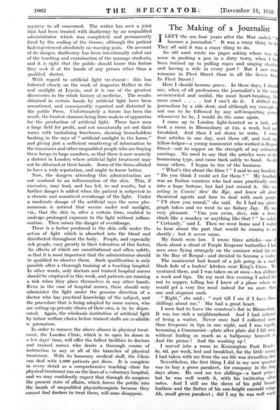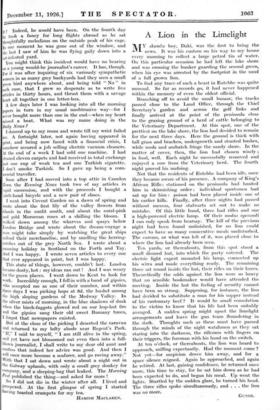The Malang of a Journalist
T LEFT the sea four years after the War ended, "t -I- become a journalist." It was a crazy thing to do They all said it was a crazy thing to do.
An old aunt wrote me pages asking where was th sense in pushing a pen in a dirty town, when I ha been trained up to pulling ropes and singing shantic and having a wife in every port ? But I saw mo romance in Fleet Street than in all the Seven Seas In Fleet Street !
Here I should become grave. In these days, I shout say, when of all professions the journalist's is the mos overcrowded and sordid, the most heart-breaking, the most cruel . . . . but I can't do it. I drifted int1 journalism by a side door, and although my example ' not one to be followed by any self-respecting perso whosoever he be, I would do the same again.
I came up to London light-hearted as a lark, and took a room in Bloomsbury at 14s. a week, bed and breakfast. And then I sat down to write. I wrot four articles in one day, sent them off, and took my fellow-lodger—a young manicurist who worked in Regent Street—out to supper on the strength of my estimated earnings. No need to say that the articles were of the boomerang type, and came back safely to hand. So did many others. I began to tire of the business.
" What's this about the films ? " I said to my landlady. " Do you think I could act for them ? " My landlady was an Italian countess who had once practically come into a huge fortune, but had just missed it. She was acting in Comin' thro' the Rye, and knew all about theatrical agents and how to deal with such people.
" I'll show you round," she said. So I had my photo- graph taken and we went to see Sidney Jay. Iie was very pleasant. " Can you swim, dive, ride a horse, climb like a monkey or anything like that ? " he asked. " Certainly," said I. Then we went home and I waited to hear about the part that would be coming to me shortly ; but it never came.
My funds were low. I wrote three articles—one of them about a cloud of Purple Emperor butterflies I had seen once flying strangely on the summer wind far out in the Bay of Bengal—and decided to become a waiter. The manicurist had heard of a job going in a small black hole of a loafers' kitchen near King's Cross. We ventured there, and I was taken on at once—ten shillings a week and tips. On my next free evening I asked her out to supper, telling her I knew of a place where we would get a very fine meal indeed for no more than one and sixpence each.
" Right," she said ; " wait till I see if I have three shillings about me." She had a great heart.
I soon had to leave the countess's flat in Bloomsbury. It was too rich a neighbourhood. And I had sickened of being a waiter. Never once had I collected more than fivepence in tips in one night, and I was rapidly becoming a CoMmunist—plate after plate did I lift away without finding so much as a halfpenny beneath it. And the grease ! And the washing up ! I moved into a room in Kennington Park Road– '6s. 6d. per week, bed and breakfast, for the little money I had taken with me from the sea life was dwindling fast.
Nevertheless, the first thing I did in my new quarter` was to buy a green parakeet, for company in the long days alone. He cost me ten shillings—a hard price– but he was well worth it, with his twittering Ova notes. And I still see the sheen of his gold breast- feathers and the flutter of his sun-bright emerald wings. Ah, small green parakeet ; did I say he was well worth it? Indeed, he would have been. On the fourth day be took a fancy for long flights abroad as he sat thoughtfully melodious on the outside peak of his cage. In one moment he was gone out of the window, and the last I saw of him he was flying gaily down into a eat-infested yard.
You might think this incident would have no bearing on a young would-be journalist's career. It has, though.
For it was after inquiring of six variously sympathetic women in as many grey backyards had they seen a small green bird anywhere about, and being told " No " in each case, that I grew so desperate as to write five articles in thirty hours, and thrust them with a savage heart all together in one letter-box.
A few days later I was looking into all the morning papers in turn in my usual unobtrusive way—for I never bought more than one in the end—when my heart missed a beat. What was my name doing in the Daily News?
I danced up to my room and wrote till my wrist failed me. A fortnight later, not again having appeared in print, and being now faced with a financial crisis, I somehow secured a job selling electric vacuum cleaners. At the end of a week I had sold one machine. I had cleaned eleven carpets and had received in total exchange lust one cup of weak tea and one Turkish cigarette. I don't smoke Turkish. So I gave up being a com- mercial traveller.
Soon after I had moved into a top attic in Camden Town the Evening News took two of my articles in sapid succession, and with the proceeds I bought a ninth-hand bicycle and a new pair of shoes.
I went into Covent Garden on a dawn of spring and wrote about the first lily of the valley flowers from islands in the sunlit south, and about the coral-pink and gold Moroccan roses at a shilling the bloom. I walked down among the wharves and quays beloW London Bridge and wrote about the dream-voyage a man might take simply by watching the great ships unload their merchandise, and by smelling the herring- catches out of the grey North Sea. I wrote about a canoeing holiday in Scotland on the Forth and Tay. And I was happy. I wrote seven articles to every one that ever appeared in print, but I was happy.
This state of things, however, couldn't last. London became dusty, hot : my ideas ran out ! And I was weary for the green places. I went down to Kent to look for work. Incredibly enough, I fell in with a band of gipsies, who accepted me as one of their number, and within three days I was picking hops at 8d. the bushel among the high sloping gardens of the Medway Valley. In the silver mists of morning, in the blue shadows of dusk when the birch-faggots glowed red on our hop-hut fire and the gipsies sang their old sweet Romany tunes, I forgot that newspapers existed. But at the close of the picking I deserted the caravan and returned to my lofty abode near Regent's Park. If," I said to myself, " I am still alive in the spring, and yet have not blossomed out even then into a full- blown journalist, I shall write to my dear old aunt and confess that indeed her advice was good. And then I will once•more become a seafarer, and go roving away." With that I sat down and wrote about a night out in the Galway uplands, with only a small grey donkey for company, and a 'sleeping-bag that leaked. The Morning 'Post published the thing—and asked for more ! So I did not die in the winter after all. I lived and prospered. At the first glimpse of spring I started having toasted crumpets for my tea.
HAMISH MACLAREN.















































 Previous page
Previous page